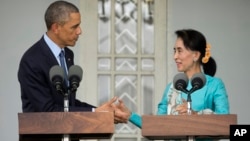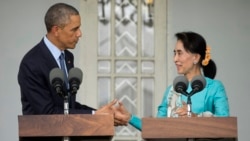More than four years ago, after nearly five decades of military rule, Burma embarked on a path toward democracy. A newly elected, largely civilian government took the reins in the spring of 2011, and gradually began to take important steps toward significant social, political and economic reform.
In November 2012, Barack Obama became the first sitting U.S. President to visit Burma. He recalled that experience during a recent press conference with Burmese politician and pro-democracy leader Aung San Suu Kyi, at her home in Yangon.
“In the past two years, important changes have been made. The economy has begun to grow, political prisoners have been set free, there are more newspapers and media outlets, children have been released from the military. And these are all important changes that have opened up greater opportunity for the people of Burma,” said President Obama.
“At the same time, it’s clear how much hard work remains to be done, and that many difficult choices still lie ahead,” he said:
“The process for reform is by no means complete, or irreversible. For many, progress has not come fast enough, or spread far enough. People need to feel safe in their homes and not be subject to arbitrary harassment by authorities, or individuals acting with impunity. People need to be empowered to pursue their dreams. And as Burma approaches important national elections next year, it will be important to ensure that all of Burma’s people can participate in shaping the future of their country.”
Now, Burma needs to take the next important steps on the path to democracy. These include strengthening the rule of law, continued constitutional changes to move Burma more fully towards a civilian government, diffusing sectarian tensions among Burma’s diverse ethnic groups, ending discrimination, providing greater security and economic opportunities for the Burmese people and strengthening their human rights protections.
Two years ago, President Obama pledged that if Burma continued to progress toward democracy, the United States would help ensure Burma’s success. “We’ve made good on that pledge,” said President Obama. “[The United States] wants to reiterate the commitment to match continued reforms with greater support and friendships in the future.”

















